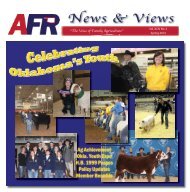Oklahoma Farmers Union - American Farmers & Ranchers
Oklahoma Farmers Union - American Farmers & Ranchers
Oklahoma Farmers Union - American Farmers & Ranchers
You also want an ePaper? Increase the reach of your titles
YUMPU automatically turns print PDFs into web optimized ePapers that Google loves.
Bill advocated soil bank that he said would “help no one but the doctors, druggists,<br />
lawyers, and big business.” He softened a bit when Johnson called for an extension of<br />
current government commodity programs.<br />
Back at the Legislature, <strong>Union</strong> members Rep. Bill Briscoe and Senator Byron<br />
Dacus pushed through H.B. 508 that created a Wheat Commission for the state. The bill<br />
allowed the commission to conduct research and market development for wheat utilizing<br />
a levied two and one-half mill per bushel promotion fee on <strong>Oklahoma</strong> marketed wheat.<br />
Equally successful with SB 110, Stone gladly watched Governor Henry Bellmon sign the<br />
bill into law exempting fertilizer from sales tax – primarily an OFU initiative. The bill<br />
was estimated to be worth $640,000 in savings to state farmers each year in taxes.<br />
In 1967 the <strong>Union</strong> was finally successful in getting a bill passed which exempted<br />
farm machinery from sales taxes. Governor Dewey Bartlett signed the bill into law.<br />
Corporate farming reared its head that same year as legislation began to move in the state<br />
legislature and the <strong>Union</strong> was there to fight invoking the work of former member<br />
Governor Bill Murray.<br />
Always willing to cross party lines under Stone’s presidency, <strong>Union</strong> members<br />
were happy with the Nixon Administration’s announcement of the Agricultural Act of<br />
1973. The idea was from an earlier <strong>Farmers</strong> <strong>Union</strong> proposal. The approach by Harry<br />
Truman’s Agriculture Secretary Charles F. Brannan supported farm incomes rather than<br />
prices. A “target price” would be established by law for the basic crops of wheat, feed<br />
grains, and cotton and the farmer would sell his crops for whatever the market would<br />
bring. If the average prices fell below these established targets, the government would<br />
give the farmer a check for the difference, with a limit in the bill of $20,000 per farmer.<br />
In 1977, Stone and other agriculture leaders told President Jimmy Carter their plan to cut<br />
both acreage and prices unacceptable. Producers were willing to make a reduction in<br />
plantings, but the reduction in price supports to 55 percent of parity over a four-year<br />
period would be damaging in light of production-cost increases expected during that<br />
time. As National President Stone continued his dialogue with Carter. He tried to<br />
change the President’s mind on the grain embargo imposed on trade with the Soviet<br />
<strong>Union</strong>. The freeze had dramatically driven grain prices down. When the President<br />
refused, Stone decided that Carter was a “one-termer” and told him so. <strong>Farmers</strong> <strong>Union</strong><br />
continued its’ fight with President Ronald Reagan when he proposed the elimination of<br />
target levels that guaranteed the assured prices that farmers received on their products.<br />
With the election of Jimmie L. Jarrell to succeed Stone, issues such as inflation,<br />
energy shortages, and the “off and on again” Russian grain trade deal occupied his time.<br />
In 1980, Jarrell and other OFU members lobbied for relief from royalty owners taxation<br />
at a windfall profits tax hearing. End the grain embargo was the battle cry of the <strong>Union</strong><br />
in Washington while at home estate probating relief was achieved in the legislature. In<br />
1981, a support level of $600 per ton was achieved for peanuts and national debate over<br />
grain elevator bankruptcies and farmers stored grain in those elevators ensued and the<br />
<strong>Union</strong> applauded Senator Robert Dole’s efforts on the issue. Testimony was delivered in<br />
Washington on the continuing high interest rates and the new national farm bill signed by



